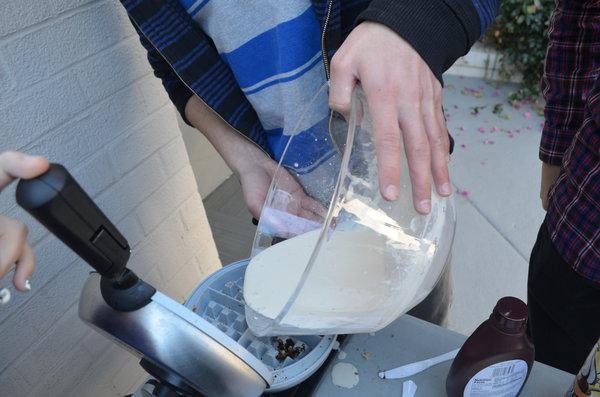For ‘Bo’s Bar’ and ‘Will’s Waffles,’ road to expansion follows halachic path

FRESH: Sophomores Jacob Dauer and Eric Bazak cook waffles during breakfast.
January 24, 2014
Both Will’s Waffle Works and Bo’s Barista Bar recently resolved issues regarding Jewish Law, which arose in the process of enlarging their businesses and provided hands-on experience with halacha.
Bo’s Barista Bar faced the problem of whether or not it is halakhically permitted to accept investments and repay their investors in interest, while Will’s Waffle Works underwent the process of purifying their dishes, a protocol known as tevilat keilim.
The two businesses, both operated by sophomores Boaz Willis and Will Bernstein, share customers, profits and ideals, and they both have followed religious journeys in order to operate at school. For guidance, they turned to the Judaic Studies staff.
In Town Hall on Dec. 19, Boaz announced they would be looking for investors. Investors would not receive a share of the company or its profits, he said, but rather would be paid interest on the loan.
“We are trying to emulate a real business,” Boaz explained, “and we are always looking to improve.”
But according to halacha, a Jew cannot collect interest from a fellow Jew. Both Boaz and Will were unaware of this law until The Boiling Point asked them about it. To solve the issue, Boaz and Will turned to the Judaic Studies staff for guidance.
Both Rabbi David Stein and Rabbi Ari Schwarzberg said that the easiest way around the law was to conduct the transaction through a non-Jew. Boaz and Will asked Ivan Donadic, the school’s IT Consultant, to help, and he agreed.
Ivan will receive the money from the investors, then Ivan will invest that money in Boaz and Will’s business, and Boaz and Will will pay interest to Ivan, which he will then pass on to the investors.
Physically speaking, the sophomores will give Ivan some sheets of paper in return for his investment, and he will sell the paper to the investors. Rabbi Stein approved this method, thus allowing them to accept investments from any person while still abiding by Jewish law.
With the investment money, Will and Boaz plan to buy kippot, which they’ll sell at a profit while also advertising their business. Investors will earn interest, and the rest will be invested into more business expansion and 10 percent to charity.
Meanwhile, Bo’s Barista Bar’s culinary counterpart, Will’s Waffle Works, had to undergo the process of tevilat keilim, or cleansing and purifying their dishes and utensils, before they could start selling waffles along with hot and cold beverages at breakfast. The pair have been operating a breakfast food stand in the parking lot next to the Annex since late November.
Halacha states that all dishes that have been previously owned by non-Jews, must be dipped in a mikvah keilim — a mikvah for vessels — before Jews can use them. This halacha grows out of verses in Chapter 31 of Bamidbar that describe how to purify vessels captured in war.
In Will’s case, this had to happen before the waffle business could be launched, or the new food would be considered impure.
“We are not allowed to give it out if it’s tamei,” said sophomore Eric Bazak, using the Hebrew word for impure. As an employee of Will’s Waffle Works, Eric spearheaded the toveling process.
Eric and Rabbi Stein brought the utensils to the mikvah keilim behind Anshe Emes synagogue on Robertson Boulevard and immersed them there. Since tevilat keilim is not in the Judaic curriculum, Rabbi Stein figured this would be an opportunity to combine a religious discussion with a hands-on experience.
“There are areas of halacha that we don’t regularly study,” said Rabbi Stein. “I thought this is a great opportunity to kind of experientially learn about this huge area of halacha that is very relevant.”
Eric also learned the different methods of toveling for various materials such as aluminum, glass and metals. These vessels consist of anything used for food preparation that have had contact with non-kosher food or were previously owned by non-Jews, including stores and markets. Anything wooden, plastic, rubber or disposable needs not be toveled, the rabbis said.
A problem arose with the waffle maker itself, however. Immersing it in deep water would have ruined the electrical connections, rendering the waffle iron useless.
Principal Reb Noam Weissman told him that in fact he did not have to take the waffle maker to the mikvah since it would break. The first waffles were served on Jan. 6.
“Halacha is a huge body of law and it would be impossible to cover all of it, even in Shalhevet’s award-winning Judaic Studies curriculum,” Rabbi Stein told the Boiling Point in an e-mail interview.
Rabbi Stein was happy to help the sophomores solve their halachic conundrum, and saw it as more than just a practical lesson.
“Whether you are running a business or working for somebody, we live our lives by and conduct our actions through our halachic observance,” Rabbi Stein said. “It’s not just a business lesson, but it’s a lesson in how halacha plays a role in the business operation of a company.












